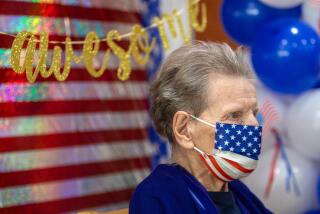HISTORY RE-RIVETED
- Share via
Tina Hill is always asked the same question: Did she know she was making history when she became a “Rosie the Riveter” during World War II?
Yes and no.
“I knew I was making history for myself, but I didn’t know I was making history for anyone else. Always as a little child, there were two or three things I always wanted in my house. I didn’t want a leaky roof and I didn’t want a lot of fussing and fighting. Up until now, I have had some leaks, but I’ve had no fighting!”
Hill, now 76 and living in Los Angeles, is among the women profiled on the first installment of TBS’ six-hour “A Century of Women.” The Texas native migrated to Los Angeles in 1940 to seek a better life. She found unheard-of economic freedom for a black woman when she began working in one of the many defense-industry facilities sprouting in Southern California during World War II. After the men returned from the war, she continued working at the plant, run by North American Aviation (now known as Rockwell). She retired in 1980, after 37 years.
“They didn’t have a lot of jobs for black people then, especially women,” Hill says. “Some of them had jobs working in the hotels. They had a few black teachers.”
When Hill came to Los Angeles to stay with an aunt, all she could find was domestic work. Then came the Japanese attack on Pearl Harbor. “I went home and married my childhood sweetheart. He went into the service and I came back to Los Angeles again. They were hiring people, so I went to the plant and put in my application that day.
She applied at North American Aviation. “They hired me and they sent me to a training school for six weeks. They paid you the same thing as if you were working regular. That old 40 cents an hour was a lot of money. I would bring home about $16 a week.” As a domestic, she earned $40 a month.
She was happy working at the plant, she recalls, “as long as I was making some money that was sufficient and I was able to spend it as I wanted to. I was home with my family when night came. That’s what I liked.”
World War II, she says, “helped every woman who was breathing air because they learned to manage things and do things. We just learned a lot. We learned how to do things we thought we couldn’t do.”
If there was racism at the plant, Hill says, “you couldn’t show it. Roosevelt was a good President and he opened up the doors and things for us to go in these different places to work.” Whites, she says, “didn’t want us to get ahead. They wanted us to stay back. Hitler got the black woman out of the white woman’s kitchen.”
More to Read
The complete guide to home viewing
Get Screen Gab for everything about the TV shows and streaming movies everyone’s talking about.
You may occasionally receive promotional content from the Los Angeles Times.







